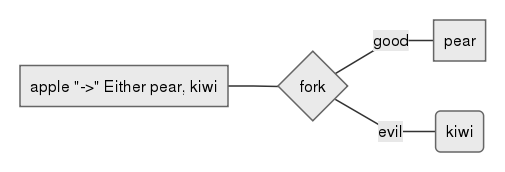A library to bring some of the best elements of Haskell functional programming into Ruby.
Except, where Haskell is overly general and nigh unapproachable, here I try to build an actually useful set of functional tools for day-to-day Ruby programming
Features:
*note, see spec/arrows/proc_spec.rb to get an idea how to use this junk
If given x -> F -> y and y -> G -> z
Returns x -> H -> z
As in we pipe what F poops out into the mouth of G a la Human Centipede
f = Arrows.lift -> (apple) { apple.to_orange }
g = Arrows.lift -> (orange) { orange.to_kiwi }
apple_to_kiwi = f >> gCalls map (in Haskell, they generalize it to fmap) on the data passed in
So... If given x -> F -> y and [x]
Returns [x] -> F -> [z]
apples = Arrows.lift [apple, apple, apple]
apple_to_kiwi = Arrows.lift -> (apple) { apple.to_kiwi }
kiwis = apples >= apple_to_kiwix -> y x -> z becomes x -> [y,z]
apple_to_orange = Arrows.lift -> (apple) { apple.to_orange }
apple_to_kiwi = Arrows.lift -> (apple) { apple.to_kiwi }
orange_and_kiwi = Arrows.lift(apple) >> (apple_to_orange / apple_to_kiwi)f ^ g produces a proc that takes in a Either, and if either is good, f is evaluated, if either is evil, g is evaluated
apple_to_orange = Arrows.lift -> (apple) { apple.to_orange }
apple_to_kiwi = Arrows.lift -> (apple) { apple.to_kiwi }
orange = Arrows.lift(apple) >> Arrows::Good >> (apple_to_orange ^ apple_to_kiwi)
kiwi = Arrows.lift(apple) >> Arrows::Evil >> (apple_to_orange ^ apple_to_kiwi)step <=> chose produces a proc that cycles between step and chose until chose returns a good either. Then returns whatever was in the good either
context '<=> feedback' do
let(:step) { Arrows.lift -> (arg_acc) { [arg_acc.first - 1, arg_acc.reduce(&:*)] } }
let(:chose) { Arrows.lift -> (arg_acc) { arg_acc.first < 1 ? Arrows.good(arg_acc.last) : Arrows.evil(arg_acc) } }
let(:factorial) { step <=> chose }
context '120' do
let(:one_twenty) { Arrows.lift(5) >> factorial }
subject { one_twenty.call }
specify { should eq 120 }
end
context '1' do
let(:one) { Arrows.lift(1) >> factorial }
subject { one.call }
specify { should eq 1 }
end
context '0' do
let(:zero) { Arrows.lift(0) >> factorial }
subject { zero.call }
specify { should eq 0 }
end
end@some_process = Arrows.lift -> (a) { a }
@memoized_process = @some_process.memoize@times_two = Arrows.lift -> (x) { x * 2 }
@plus_one = Arrows.lift -> (x) { x == 4 ? raise(SomeError, "error: #{x}") : (x + 1) }
@times_two_plus_one = @times_two >> @plus_one
@caught_process = @times_two_plus_one.rescue_from(SomeError) { |error, arg| "we fucked up on: #{arg}" }
@caught_process.call 1 # 3
@caught_process.call 2 # we fucked up on: 2Suppose you're running rails (lol what else is there in ruby?) for some sort of ecommerce app and you have an OfferController that handles inputs from an user who is trying to make an offer on some listing you have. Your controller might look like this:
class OfferController < ApplicationController
rescue_from ActiveRecord::HasCancer
def create
if user_signed_in?
offer = current_user.offers.new offer_params
else
user = User.create! offer_params[:user]
login_in(user)
offer = user.offers.new offer_params
end
if offer.valid?
if offer.save!
mail = OfferNotificationMailer.new_offer offer
mail.deliver!
render offer
end
else
if ...cancer
end
end
private
def stuff
...
end
class Offer < ActiveRecord::Base
...
after_create :queue_some_job, :dispatch_invoice
...
endIf it does, I'm sorry to inform you, but your codebase has cancer. Functional Arrows can help resolve this by linearization your currently highly nonlinear Object-Oriented business logic
class OfferController < ApplicationController
def create
offer_creation_process.call
end
private
def offer_creation_process
offer_params >> initialize_user >> initialize_new_offer >> persist_offer >> deliver_mail / render_view
end
def offer_params
...
end
def initialize_user
...
end
...
endThat is, offer creation has been reduced back down to a process with distinct steps.
Here's an example directly from one of my other applications
class Apiv1::Contacts::UpdateController < Apiv1::UsersController
before_filter :_enforce_correct_user
def update
_update_process.call
end
private
def _enforce_correct_user
unless current_user.admin? || current_user.contacts.include?(_contact)
render json: { message: "This isn't your listing" }, status: 401
end
end
def _update_process
_user_inputs >> _apply_changes >> _decide_validity >> (_update_valid_data_process ^ _render_failure)
end
def _update_valid_data_process
_save_changes >> _decide_primality >> (_make_primary ^ Arrows::ID) >> _render_success
end
def _user_inputs
Arrows.lift _contact
end
def _apply_changes
Arrows.lift -> (contact) { contact.tap { |p| p.assign_attributes _contact_params } }
end
def _decide_validity
Arrows.lift -> (contact) { contact.valid? ? Arrows.good(contact) : Arrows.evil(contact) }
end
def _decide_primality
Arrows.lift -> (contact) { _contact_params[:status] == "primary" ? Arrows.good(contact) : Arrows.evil(contact) }
end
def _render_success
Arrows.lift -> (contact) { render json: { contact: contact.to_ember_hash } }
end
def _save_changes
Arrows.lift -> (contact) { contact.tap(&:save!) }
end
def _make_primary
Arrows.lift -> (contact) { contact.tap &:make_primary! }
end
def _render_failure
Arrows.lift -> (contact) { render json: contact.errors.to_h, status: :expectation_failed }
end
def _contact
@contact ||= Apiv1::UserContact.find params[:id]
end
def _contact_params
@contact_params ||= params.require(:contact).permit(:name, :phone, :email, :address, :status)
end
endAdd this line to your application's Gemfile:
gem 'arrows'And then execute:
$ bundle
Or install it yourself as:
$ gem install arrows
TODO: Write usage instructions here
- Fork it ( https://github.com/[my-github-username]/arrows/fork )
- Create your feature branch (
git checkout -b my-new-feature) - Commit your changes (
git commit -am 'Add some feature') - Push to the branch (
git push origin my-new-feature) - Create a new Pull Request




